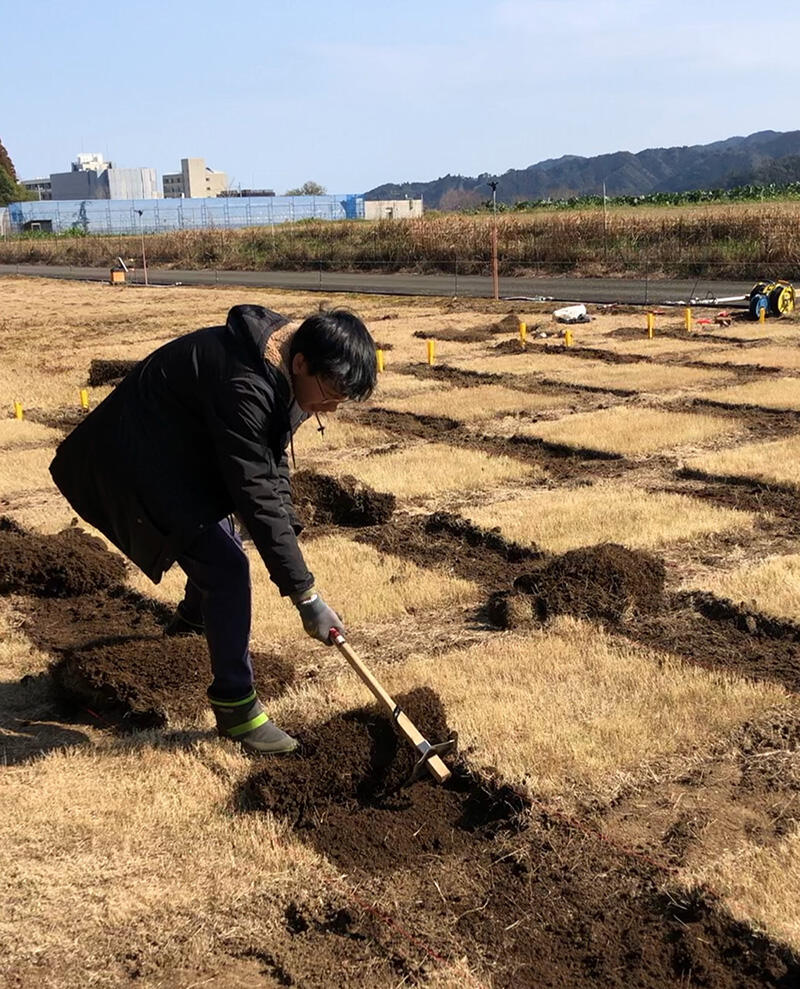Pongpiyapaiboon Sorawich さん
- トップページ
- 次世代研究者インタビュー
- Pongpiyapaiboon Sorawich さん
資源環境科学専攻
環境共生科学教育コース 1年 Pongpiyapaiboon Sorawich さん
Q1あなたの研究テーマについて教えてください。
In our daily life, we benefit from a variety of plants. In agriculture, we select these varieties not only for their taste and visual appeal but also for their improved characteristics, such as high yields and resistance to pests and diseases. This enhancement of desirable traits is known as 'breeding,' and it continues to accelerate with the growing accessibility of genetic data. However, the precise evaluation of these traits is often more challenging than obtaining genetic information especially when we need to select from a large number of options. Therefore, my primary research focus revolves around the development of a digital phenotyping system for assessing various plant characteristics. Despite the advancements in genomics, proteomics, and other fields, many researchers continue to manually collect data to assess plant growth and yield. To accelerate breeding research and assist researchers, this digital phenotyping system leverages 3D modeling technology to measure and evaluate individual plants. 3D model of plants was reconstructed from stereo images, and by employing various techniques we can simplify and enhance the plant measurement process compared to traditional manual methods.
Q2いつ頃から大学院博士後期課程への進学を意識しましたか?
When I first came to Japan as undergraduate student, I started to realize my passion is to become an educator, a professor at university. To achieve that goal, I worked hard to study in my undergraduate and master course. Additionally, I recognized that Japan is a leading country in various fields of research and technology, including agriculture, making it an ideal environment for learning and growth.
Q3大学院博士後期課程での学生生活について教えてください。
As a doctoral course student, I will take more responsibility in research work, which also involves mentoring undergraduate students in the laboratory. I am working on experiment inside laboratory, greenhouse, and fields. While I dedicate a significant portion of my time to my research at the university, I will also prioritize maintaining a work-life balance by setting aside time for my hobbies and spending quality moments with my family.
Q4次世代研究者挑戦的研究プログラムに採用後、何か変わりましたか?
When I got accepted to this JST Support for Pioneering Research Initiated by the Next Generation program, I have realized that I received more than a financial support. This program has also granted me opportunity to learn about the management of research funds within university regulations and more importantly I have learned importance of every yen allocated for research. Furthermore, this program has facilitated interactions with fellow Ph.D. students from diverse research backgrounds, both within and outside the University of Miyazaki.
Q5将来の目標について教えてください。
Growing up in a family of educators, I learned the importance of "teaching". I strongly believe that engaging in the education of the upcoming generation is equally important alongside conducting research. Following the completion of my doctoral program, I aim to become a leading researcher in the field of Digital phenotyping, while growing connections within both domestic and international networks. Ultimately, my aspiration is to attain a professorship at a university in Japan. I always dream of being an educator who can convey the joy of research and the excitement of learning. I want to make a global impact by focusing on the advancement of agriculture and the nurturing of future talents. I aim to achieve this not only in Japan and Thailand but worldwide through research and educational efforts.

 お問い合わせ
お問い合わせ
本事業に関するお問い合わせは、
以下へお願いします。
宮崎大学 次世代研究者支援室



